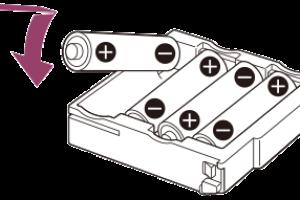Mastering Battery Insertion: A Comprehensive Guide for Optimal Usage

-
Quick Links:
- Introduction
- Understanding Batteries
- Types of Batteries
- How to Insert Batteries the Right Way
- Common Mistakes When Inserting Batteries
- Battery Care and Maintenance
- Safety Tips for Battery Usage
- Case Studies and Real-World Examples
- Expert Insights
- FAQs
Introduction
In today's technology-driven world, batteries power many of our everyday devices, from remote controls to smartphones. However, inserting batteries incorrectly can lead to device malfunction, reduced performance, or even safety hazards. In this comprehensive guide, we will explore the importance of proper battery insertion, the various types of batteries available, and the step-by-step process to ensure you insert batteries the right way.
Understanding Batteries
Batteries are devices that store and release electrical energy. Understanding how they work is crucial for their proper use. Here's a breakdown of the essential components of a battery:
- Anode: The negative terminal that releases electrons.
- Cathode: The positive terminal that receives electrons.
- Electrolyte: A chemical medium that allows the flow of electrical charge between the anode and cathode.
When inserting batteries, it's vital to pay attention to these components to ensure optimal performance.
Types of Batteries
There are several types of batteries you may encounter, including:
- Alkaline Batteries: Commonly used in household devices.
- Rechargeable Batteries: Such as NiMH (Nickel-Metal Hydride) and Li-ion (Lithium-ion), used in electronics like smartphones and laptops.
- Button Cell Batteries: Small batteries used in watches and small electronics.
- Lead-Acid Batteries: Typically used in vehicles and larger machinery.
How to Insert Batteries the Right Way
To ensure your devices operate smoothly, follow these steps to insert batteries correctly:
- Identify the Battery Type: Make sure you are using the correct type of battery for your device.
- Check the Orientation: Look for the '+' (positive) and '-' (negative) symbols inside the battery compartment.
- Insert the Batteries: Place the batteries into the compartment, matching the terminals with the symbols.
- Close the Compartment: Ensure the battery cover is securely closed to maintain proper contact.
By following these steps, you can significantly reduce the risk of device issues related to battery insertion.
Common Mistakes When Inserting Batteries
Even seasoned users can make mistakes when inserting batteries. Here are some common errors to avoid:
- Inserting batteries backward.
- Using the wrong battery type.
- Not checking for corrosion or damage in the battery compartment.
- Forgetting to secure the battery cover properly.
Battery Care and Maintenance
Proper care and maintenance can extend the life of your batteries significantly. Here are some tips:
- Store batteries in a cool, dry place.
- Regularly check devices for battery corrosion.
- Replace all batteries in a device at the same time.
- Charge rechargeable batteries fully before using.
Safety Tips for Battery Usage
To ensure your safety when using batteries, follow these guidelines:
- Never mix old and new batteries.
- Avoid short-circuiting batteries.
- Dispose of batteries properly according to local regulations.
- Keep batteries away from heat and moisture.
Case Studies and Real-World Examples
To illustrate the importance of correct battery insertion and maintenance, let’s explore a few case studies:
Case Study 1: Remote Control Malfunction
A family experienced issues with their remote control not working. Upon inspection, it was found that the batteries were inserted incorrectly, leading to a loss of contact. After correcting the orientation, the remote functioned perfectly.
Case Study 2: Smartphone Battery Problems
A user faced frequent shutdowns with their smartphone. The issue was traced back to poor battery contacts due to corrosion. Regular maintenance and proper battery insertion resolved the issue.
Expert Insights
Experts recommend regularly checking your devices for battery health. Dr. Jane Smith, an electronics technician, states, "Understanding the proper way to insert batteries is crucial. It not only extends the life of your devices but also ensures safety and efficiency." These insights stress the importance of education in battery maintenance.
FAQs
FAQs
1. What happens if I insert a battery incorrectly?
If inserted incorrectly, a battery may not power the device or could potentially leak, causing damage.
2. Can I use different brands of batteries together?
It is not recommended to mix brands, as this can lead to performance issues.
3. How do I know if a battery is dead?
Check if the device works with a new battery. If not, the device may also have issues.
4. Is it safe to recharge alkaline batteries?
No, alkaline batteries are not designed to be recharged and can leak or explode if charged.
5. How long do rechargeable batteries last?
Rechargeable batteries can last between 2 to 5 years, depending on usage and care.
6. What should I do with old batteries?
Recycle old batteries according to local regulations to ensure safety and environmental care.
7. Can batteries leak if left in a device?
Yes, batteries can leak if left in a device for an extended period, especially if they are dead.
8. How can I extend battery life?
Limit usage of high-drain devices, store batteries properly, and regularly check for maintenance.
9. What are the signs of battery corrosion?
Signs include white, powdery residue around the battery terminals or a bulging battery case.
10. Can I use rechargeable batteries in all devices?
Most devices that use standard batteries can accommodate rechargeable ones, but always check compatibility.
Random Reads
- The complete guide to satellite dish installation
- How to reset frigidaire dishwasher
- How to synchronize wii remote
- How to synchronize folders files
- How to make math symbols on your mac
- How to trade items on team fortress 2
- How to type apple logo
- How to turn website into app shortcut chrome
- How to open winmail dat
- How to open wps files